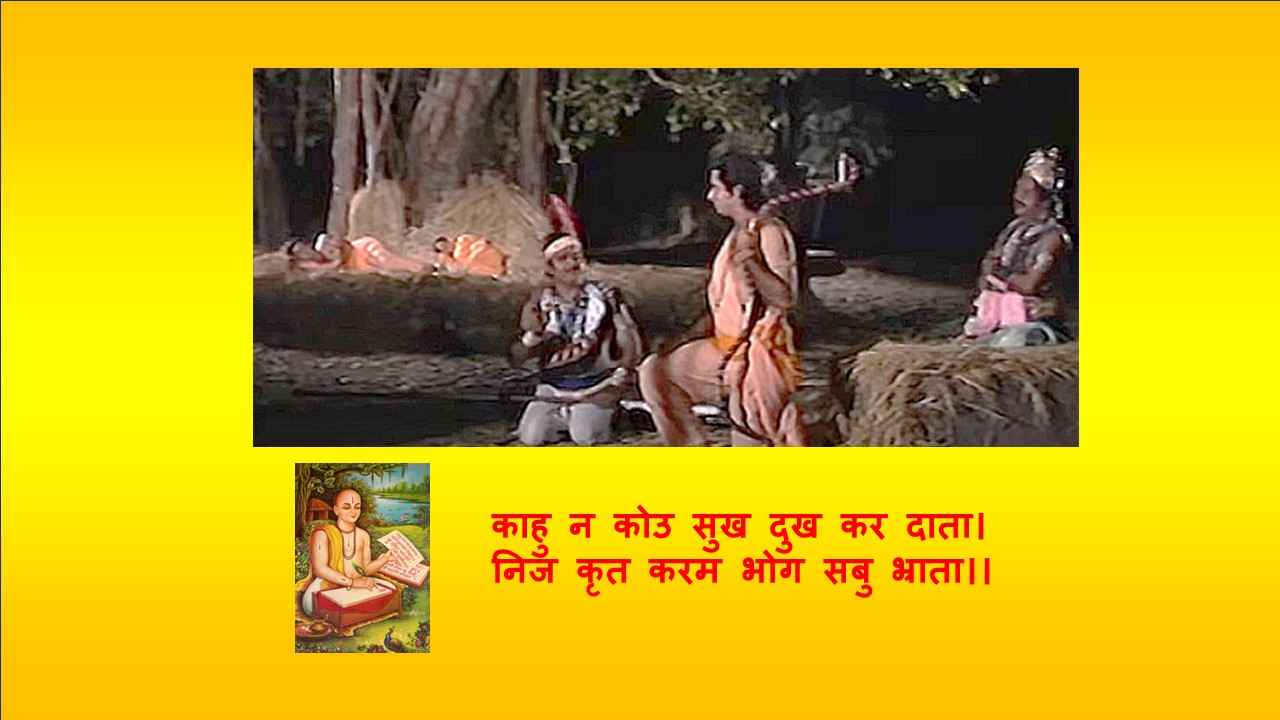In the satsang of Sri Hit Premanand Ji Maharaj, a question was asked if one’s life can be affected by someone’s good or ill-wishes. And pujya shri replies, “कोन न काहु के सुख दुःख कर दाता”, and then he explains that it’s our own deeds that decides our circumstances.
Introduction
In the sacred verses of Goswami Tulsidas’ Ramcharitmanas, a poignant episode unfolds during the Ayodhya Kaand (Reference: Sri Ramcharitmanas, Ayodhya Kaand, Doha 92) , where profound wisdom is imparted by Lakshmana. It is a moment that encapsulates the timeless philosophy of karma, emphasizing personal responsibility for one’s joys and sorrows. Let’s delve into the narrative where Lakshmana imparts a lesson that transcends time and resonates with the essence of righteous living.
The Setting
As Lord Rama, accompanied by his devoted wife Sita and loyal brother Lakshmana, traverses the arduous path of exile, they come across the Ganges River.
Nishadraj Guha, observing the seemingly adverse circumstances that have befallen the illustrious trio, expresses his lamentation. He questions the twists of fate that have led Rama, Sita, and Lakshmana, who once dwelled in the opulence of a palace, to find respite under the humble shelter of a tree on the riverbank.
The Lesson
In response to Nishadraj Guha’s reflection on the apparent misfortune of Rama and Sita, Lakshmana, in a tone resonating with both compassion and wisdom, utters the timeless words: “काहु न कोउ सुख दुख कर दाता। निज कृत करम भोग सबु भ्राता।।”.
This expression encapsulates the profound philosophy of karma – the understanding that individuals are the architects of their own destiny. Lakshmana gently reminds Nishadraj Guha that the challenges faced by Rama and Sita are not solely dictated by external circumstances or the actions of others. Instead, they are intricately woven into the fabric of divine justice, where each being reaps the consequences of their own deeds.
The Deeper Meaning:Lakshmana’s words resonate far beyond the banks of the Ganges; they echo through the corridors of time, inviting reflection on the universal law of cause and effect. In a world often shaped by uncertainties and external influences, the concept of karma offers a guiding light, reminding individuals of their agency in creating their destinies.
As we navigate the river of life, encountering its ebbs and flows, the wisdom imparted by Lakshmana serves as a compass. It encourages us to embrace the principles of righteousness, mindful of our actions, and cognizant of the fact that our deeds shape the narrative of our lives.
Conclusion
In the shade of wisdom, under the canopy of a timeless lesson, Lakshmana’s words echo as a reminder that amidst the challenges of life, we are the authors of our own story. The philosophy of karma, encapsulated in this poignant episode, invites us to tread the path of righteousness and accept both joy and sorrow with equanimity, knowing that our actions shape the course of our journey. As we cross the rivers of life, may the teachings of Lakshmana guide us toward the shores of enlightenment and self-realization.
